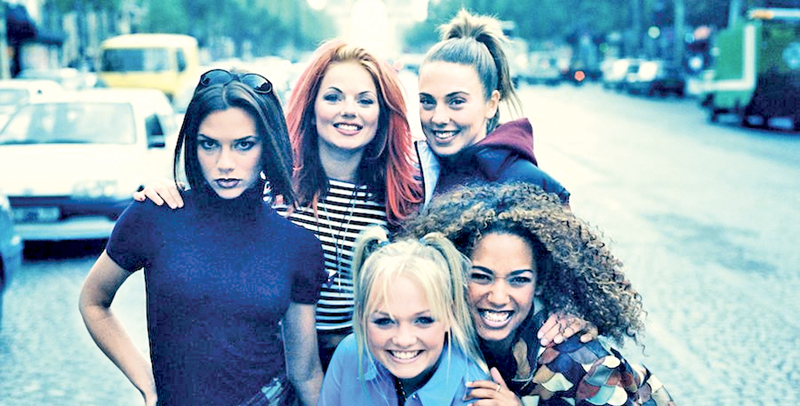In 1997, The Guardian invited noted experimental writer Kathy Acker to interview the Spice Girls, just as they were at the cusp of mega-stardom (and also their subsequent dissolution) in the US. In fact, on the day of the interview, they were rehearsing for their very first live television appearance—on Saturday Night Live.
At first glance, it may seem a little strange that some editor sent a boundary-pushing postmodern feminist, a writer and performance artist whose work borders on the pornographic, to interview these peddlers of bubblegum-flavored Girl Power. But on the other hand, it actually makes perfect sense.
As Hayley Campbell pointed out, Kathy Acker was always obsessed with girl gangs, returning to the trope repeatedly in her work. “If you squinted a bit, maybe the manufactured Spice Girls were the quintessential girl gang: working class women projecting individualism and spreading the word of some kind of feminism that was palatable to their teenage fans.”
There’s something quite alluring about the idea of these two different kinds of feminism—one underground, the other mainstream, one hard-won, one brand new—coming together. (Though for all this talk of new and old, from my current vantage point, the Spice Girls’ feminism seems more outdated than Acker’s.)
Acker herself had some hesitations about the interview. According to the Campbell’s BBC show Unpopped, there’s quite a bit of unpublished material around the interview; in what was presumably an earlier draft of the introduction, Acker wrote: “When The Guardian asked me to interview the Spice Girls, whose music I had not yet heard, I looked down at their pictures and the jacket of their album and thought, in my far too rapid fashion, what is this nonsense? And then I thought, I support women, and felt the prick of curiosity.”
In fact, she wound up loving them. “There is a refusal among America’s music critics to take the Spice Girls seriously,” Acker writes in the Guardian piece.
The Rolling Stone review of Spice, their first album, refers to them as “attractive young things … brought together by a manager with a marketing concept”. The main complaint, or explanation for disregard, is that they are a “manufactured band”. What can this mean in a society of McDonald’s, Coca-Cola and En Vogue? However, an email from a Spice fan mentions that, even though he loves the girls, he detects a “couple of stereotypes surrounding women in the band’s general image.
The brunette is the woman every man wants to date. Perfect for an adventure on a midnight train, or to hire as your mistress-secretary. The blonde is the woman you take home to mother, whereas the redhead is the wild woman, the woman-with-lots-of-evil-powers.” So who are these Girls? And how political is their notorious “Girl Power”?
Even though I have seen many of their videos and photos, as soon as I’m in front of these women, I am struck by how they look far more remarkable than I had expected, even though Mel C is trying not to look as lovely as she is. I had intended to say something else, but instead I find myself asking them: “If paradise existed, what would it look like?”
If that seems strange as an opening question, Geri’s response is even stranger: “Money makes the world what it is today . . . a world infested with evil. All sorts of wars are going on at the moment. Everyone’s kind of bickering, wanting to better themselves because their next-door neighbour’s got a better lawn. That kind of thing.”
Rather political, then. Acker finds herself awed by the Spice Girls—visually (she keeps returning to their clothes, their beauty), sonically (they keep talking over one another; at times she can’t discern who says what), and, it seems to me, emotionally. They surprise her. “I can’t keep up with these Girls,” she writes. - Lit Hub



Add new comment